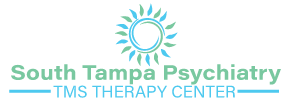Transcranial magnetic stimulation (TMS) therapy is a non-invasive treatment that sends magnetic pulses into specific regions of the brain to alleviate psychological symptoms. TMS can help to treat depression and anxiety. It can be particularly effective in cases where antidepressants and psychotherapy have not produced results. Due to using repeated magnetic pulses, TMS is also referred to as repetitive transcranial magnetic stimulation or rTMS. Call 866.273.5017 to learn more about TMS therapy programs in Tampa, Florida.
TMS Treatment Overview
TMS therapy sessions are outpatient and conducted under the direction of a technician. Sessions involve wearing a metal coil atop the head. Pulses from this coil are directed toward brain areas responsible for emotional regulation and mood. The machine emits a clicking noise as it delivers the magnetic pulses. Some people prefer to wear earplugs to reduce the clicking sound.
Each treatment session lasts anywhere from 30 to 60 minutes, depending on the advice of a medical professional and the severity of mental health symptoms. People can immediately resume normal activities following treatment sessions. Most regimens involve up to five sessions per week for at least a month.
TMS therapy is most commonly used for depression. Moreover, it is considered a go-to option for treatment-resistant depression in nearly one-third of cases. TMS therapy also holds promise in treating obsessive-compulsive disorder, anxiety disorders, post-traumatic stress disorder, and in cases of stroke rehabilitation.
TMS Therapy Side Effects
Now that you understand TMS therapy’s uses and when it can be most effective, you’re probably wondering what side effects it brings with it. Fortunately, people who receive TMS therapy experience limited side effects. Only in a few cases have patients needed to stop receiving TMS therapy due to discomfiting side effects.
The most common TMS side effect is headaches. Generally, they remain mild, never approaching the severity of a migraine. Most people experience them less and less over the course of treatment. In cases of ongoing discomfort, you can address these headaches easily through over-the-counter pain medications like Advil or Tylenol. Approximately one in every three people who get TMS therapy mention feeling pain on their scalp or twitching in their face. These side effects frequently diminish over time and your treatment professional may be able to eliminate them by adjusting the head’s coil placement.
Furthermore, TMS is not related to any of the side effects caused by antidepressants used in treating mental health disorders. Those side effects often include:
- Upset stomach
- Dry mouth
- Night sweats
- Weight gain or loss
- Drowsiness
The only serious side effect of TMS therapy is the potential for a seizure. Thankfully, the risk of a seizure in response to TMS therapy is incredibly low.
Seek Treatment at South Tampa Psychiatry Today
Deciding whether or not you should pursue TMS therapy is a decision you should do in consultation with a medical professional. Cases of treatment-resistant depression tend to experience the greatest benefits from TMS therapy. Research continues to look at who may benefit most and whether or not TMS therapy in combination with antidepressants or other therapies could produce the best results.
At South Tampa Psychiatry, we work to provide the best possible treatment for all of our clients. Through TMS therapy and a range of additional treatment options, we can successfully manage the symptoms of depression. Most clients are able to manage their symptoms and move into mental health recovery through our treatment program. In addition, if someone is experiencing mental health issues as well as an addiction, it is possible to address both conditions concurrently with dual diagnosis treatment. Reach out to South Tampa Psychiatry at 866.273.5017 to discover the benefits of our TMS therapy program in Tampa, Florida.







